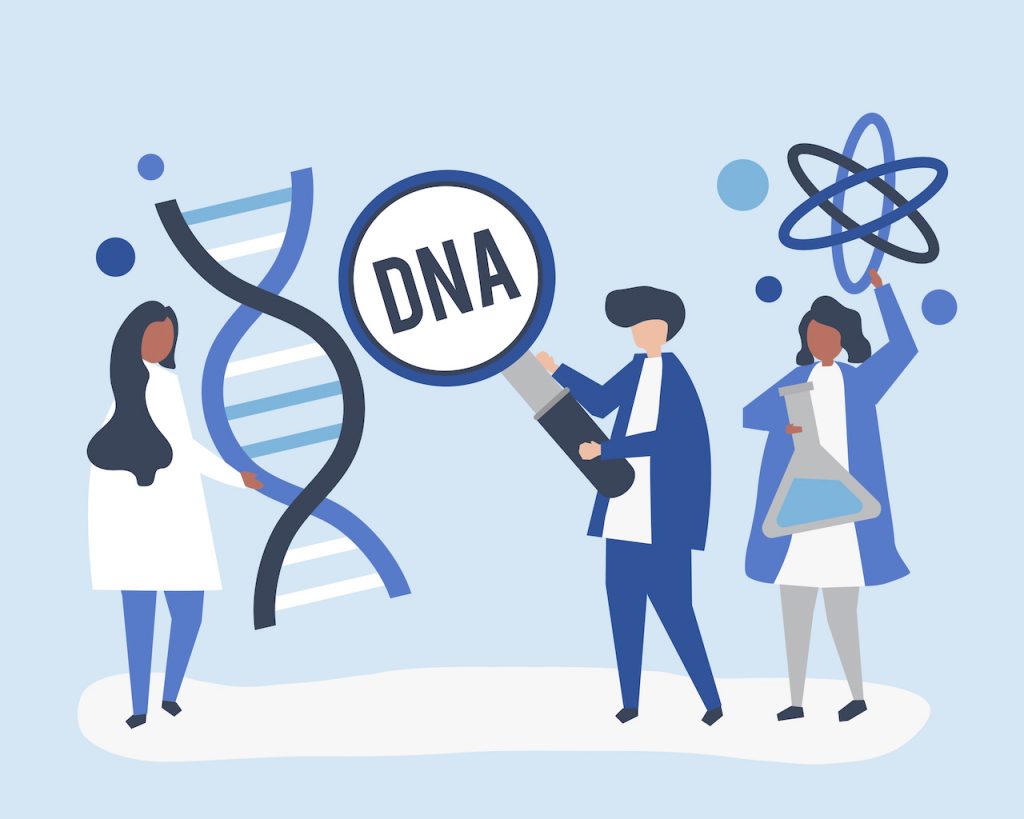Why would a couple use genetic testing?
Couples use genetic testing to help ensure a genetically normal and healthy child. They may be carriers of genetic disease that they do not want to pass down, such as Cystic Fibrosis. In other situations, the female partner may be older or have poor egg quality, or a couple has completed IVF cycles without a pregnancy, or have had recurrent miscarriages. In addition to helping couples achieve pregnancy by selecting healthy embryos for transfer, genetic tests can also uncover the cause of infertility that is holding couples back from their goal. Once we have this information, we are able to modify a personalized treatment plan and increase the odds of success.
What kinds of genetic tests are there?
There are three types of genetic embryo screening options:
Preimplantation Genetic Screening – PGS analyzes the overall chromosomal health of an embryo, which is determined by the chromosomal number present in IVF embryos. A healthy embryo has 23 complete chromosomes, while an unhealthy embryo may have more or less than that number. PGS can detect genetic issues that may be carried down, or other genetic issues such as Down Syndrome, which may occur due to age. PGS screens for numerous different genetic diseases that involve chromosome number abnormalities. PGS test results are available within 3 days at the Nairobi IVF Centre.
Preimplantation Genetic Diagnosis – PGD involves screening of IVF embryos for a specific genetic condition prior to embryo transfer. Breast cancer genes (BRCA1/BRCA2), Cystic Fibrosis and Spinal Muscular Atrophy are commonly screened conditions. The goal to select the healthiest embryos for transfer, increasing the chances of conception and healthy birth. Couples who know they are carriers of specific genetic diseases often pursue PGD. PGD test results are available within 7-10 days.
Next-Generation Sequencing – NGS is the newest platform for analyzing the chromosomal content of cells. It takes advantage of a computer-generated analysis of data and has significantly improved the study of molecular biology. NGS test results are available within 7-10 days.
What test do I take to see if I am a carrier for genetic disease?
A couple can undergo carrier screening to test whether they are dominant or recessive carriers of specific genetic diseases. Testing involves a simple blood or saliva test and once a sample is submitted to the lab, a patient can expect test results within 10-14 days.
Is there an ideal patient for genetic testing?
For couples with a known genetic disease or are known carriers of genetic disease, we recommend genetic testing by way of PGD. Women age 40 or older who may be at an increased risk of Down Syndrome, women with poor quality eggs, women who have experienced recurrent pregnancy loss, women who have experienced multiple unsuccessful rounds of IVF or women who have had an abnormal fetus or child are recommended to pursue genetic testing through PGS. Both scenarios can also pursue NGS for genetic testing as well.
How do I know which genetic screening method is best for me?
Women who are non-carriers of genetic disease most often choose PGS in order to ensure that the embryos transferred have a normal chromosomal makeup. The couple who are seeking to screen embryos for a specific disease will most often choose PGD.
What is the process for genetic testing?
In a normal IVF cycle, a woman undergoes an egg retrieval and a semen sample is collected from the man. Using a technique called intracytoplasmic sperm injection (ICSI) the eggs are fertility by sperm. Once the developing embryos reach five days of age, known as the blastocyst stage, a biopsy containing 5-10 cells is removed from each embryo for genetic testing. It commonly takes 7-10 days for test results to arrive and at that time, the most genetically viable embryo(s) is selected for embryo transfer.
Is it true that as a result of removing a cell, the embryo may not survive?
Embryo biopsy involves removing a small group of 5-10 cells from an embryo at day five, at which point the embryo is comprised of 150 cells. While embryo survival is always a risk, techniques and advancements in the field have made embryo damage extremely rare. Conversely, not testing embryos that may have genetic issues poses a greater risk to the goal of having a healthy baby. Genetically normal embryos have very high implantation potential, increasing the odds of success.
Does genetic testing create “designer babies”?
No – the designer baby controversy does not exist in any reputable facility. Genetic testing is done solely in the mission of helping parents have a healthy, genetically normal child. In some instances, certain genders may inherit genetic disease (e.g. male embryos may have Fragile X, whereas females do not) and in this instance, a specific gender is selected for health reasons.
What are the costs involved? Is it covered by insurance?
The Nairobi IVF Centre has an in-house Genomics Lab offering PGS and PGD testing services along with counsellors. The current cost of PGS is KES 200,000. The costs of PGD is bespoke to the set of genes being tested.
Can you share any patient experiences in using genetic testing?
We have many patients who share their stories to help inspire others on their journey. The two patient stories below involve using genetic testing to have a child.
How Genetic Screening Allowed One Couple to Fulfill Their Dream of Family
